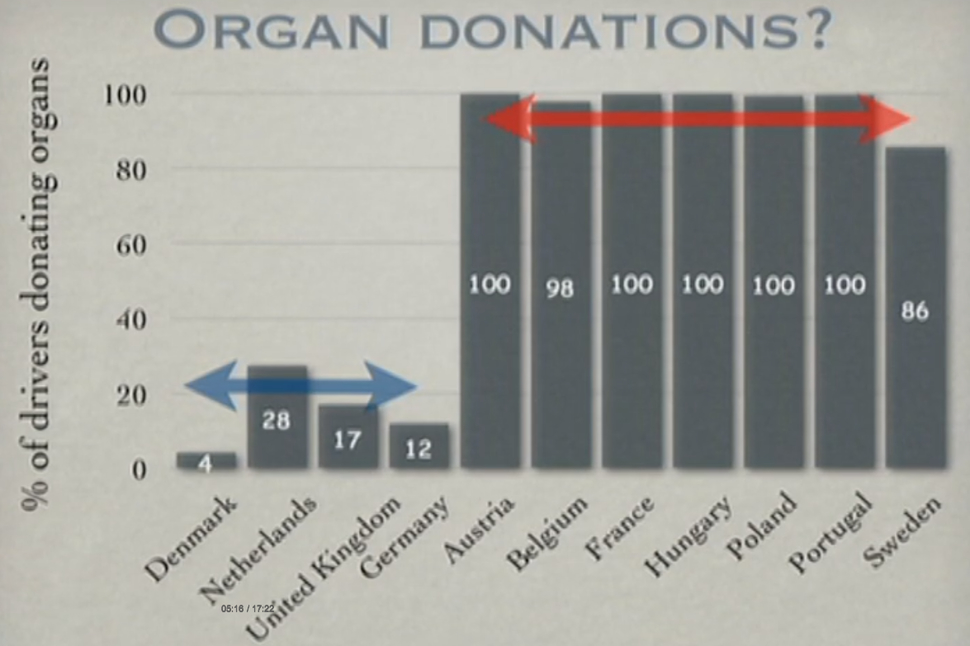There are many studies on how emotions influence the decisions people make. It like to show you some examples. A lot of us will have to make important decisions and we are obliged to make them in a responsible way. I hope this will help you.
We accept the default choice
Deciding takes afford. This effort is considered too much for our brain. We’d rather not decide, so we’re are likely to pick the default option if it’s already been chosen for us. A clear example is this.

This is a graph showing the percentage of drivers who are willing to donate organs after they die. You can see a clear distinction between the 4 countries on the left and the rest. It turns out these countries asked their citizens in some way the follow question:
“Check the box if you want to participate in the organ donor program”
Other countries with a high percentage of donors asked in some the this question:
“Check the box if you don’t want to participate in the organ donor program”
People are lazy in their decisionmaking. When we get offered to many choices, the same thing happens – we shut down, unable to decide. In turns out we often end up simply choosing the default option, just to get the process over and be done with it. If you want to know more about this example and others watch this TED talk from Dan Ariely: http://www.ted.com/talks/dan_ariely_asks_are_we_in_control_of_our_own_decisions#t-292801 (5 min in)
We make better choices in the morning and make worse decisions over time
In the morning, a chemical in our brain called serotonin is at its natural high. It helps to calm our brain. This is a good thing because we feel less risk averse in the morning due to the serotonin in our brains, so we can take risks and make harder choices early in the morning. In this clip (https://www.youtube.com/watch?v=SS4F1U5FuNM#at=141) Baba Shiv explains this more and has some more tips on improving your decision making during the day.
During the day a phenomenon called “decision fatigue” occurs. What happens is that willpower, focus, concentration and working on problem-solving are all coming from the same pool of cognitive resources. This is a scarce resource that’s easily depleted. Roy Baumiester and John Tierney wrote a book on decision fatigue. The said:
“Decision fatigue helps explain why ordinarily sensible people get angry at colleagues and families, splurge on clothes, buy junk food at the supermarket and can’t resist the dealer’s offer to rustproof their new car. No matter how rational and high-minded you try to be, you can’t make decision after decision without paying a biological price. It’s different from ordinary physical fatigue — you’re not consciously aware of being tired — but you’re low on mental energy.”
Enough breaks during problem-solving/decision-making activity are therefor really necessary. Keep this in mind next time you are working on problem, since you’re mostly not consciously aware that your brain is getting tired.
Being hungry is bad for decision-making
During the breaks it’s good to eat something. One of the funny things about how our bodies work, is that sometimes feelings or states of being can spill over from one area to another. Our physical desires work like this. If we’re feeling hunger, thirst or sexual desire, for instance, it can actually spill over into the decision areas of our brains, making us feel more desire for big rewards when we make choices. This can lead us to make higher-risk choices and to want for more. The financial crisis is caused by bad lunches in investment banks (joke).
Full bladder = better decisions
Controlling your bladder makes you better at controlling yourself when making decisions about your future , according to a study to be published in Psychological Science, a journal of the Association for Psychological Science.
Mirjam Tuk, of the University of Twente in the Netherlands, conducted an experiment where participants either drank five cups of water (about 750 milliliters), or took small sips of water from five separate cups. Then, after about 40 minutes—the amount of time it takes for water to reach the bladder—the researchers assessed participants’ self-control. Participants were asked to make eight choices; each was between receiving a small, but immediate, reward and a larger, but delayed, reward. For example, they could choose to receive either $16 tomorrow or $30 in 35 days.
The researchers found that the people with full bladders were better at holding out for the larger reward later. Other experiments reinforced this link; for example, in one, just thinking about words related to urination triggered the same effect.
According to Tuk you seem to make better decisions when you have a full bladder, so if you’re in a problem-solving/decision-making session, drink enough water and don’t allow bathroom breaks.